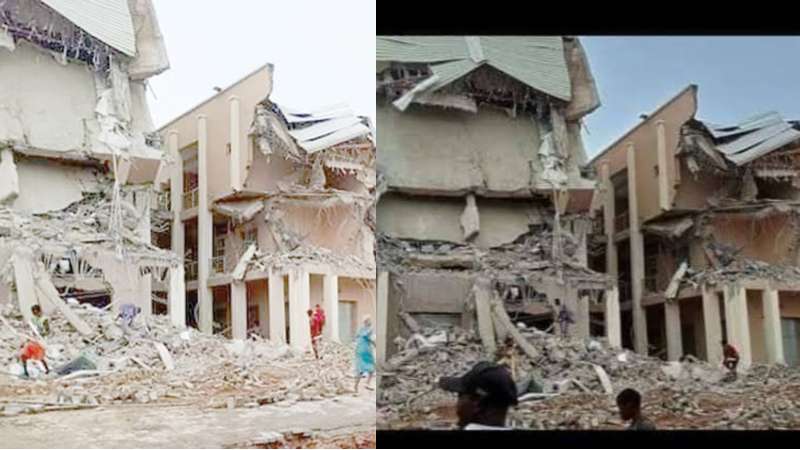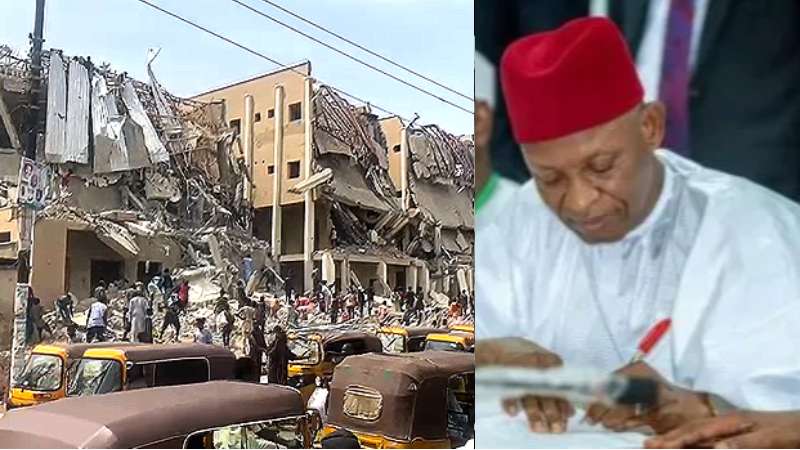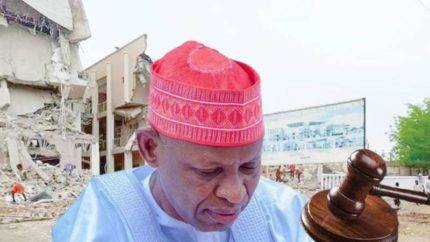The Kano State Government finds itself embroiled in a legal tussle following the unlawful demolition of properties belonging to the Incorporated Trustees of Masallacin Eid Shop Owners and Traders Association. The demolition, executed on Governor Abba Yusuf’s order, led to the filing of a lawsuit by 56 applicants on behalf of the association in the Kano division, marked FHC/KN/CS/208/2023. The lawsuit targeted multiple entities, including the state government, Kano State Urban Planning and Development Authority, and law enforcement bodies like the police and the Nigeria Security and Civil Defence Corps.
In a landmark ruling on September 29 by Justice Samuel Amobeda of the Federal High Court in Kano, the state government was directed to pay the traders compensation totaling N30 billion. However, the government’s non-compliance with the court order prompted the traders to take further legal action. They filed an ex parte motion before Justice Inyang Ekwo, seeking a Garnishee Order Nisi to attach the funds of the state government and other related bodies, amounting to N30 billion, as stipulated by the previous judgment.
Kano State Legal Battles and Agreement: Resolution on Compensation
The legal saga took a turn during the resumed hearing on Thursday, as counsel for the judgment creditors, Dr. N. A. Ayagi, presented an application for terms of settlement before Justice Ekwo. The courtroom buzzed with anticipation as Dr. Ayagi informed the court that both parties—judgment creditors (traders) and judgment debtors (state government and others)—had reached an agreement.
The terms of settlement, filed on December 13, outlined an agreement for the Kano State Government to pay N3 billion as compensation to the Incorporated Trustees of Masallacin Eid Shop Owners and Traders Association. This settlement, a stark reduction from the initially ordered N30 billion, signifies a significant compromise reached between the aggrieved traders and the state government, putting an end to a protracted legal battle that had captured public attention.

Implications and Future Prospects
The resolution of this dispute through a negotiated settlement not only marks a significant legal outcome but also carries implications for governance and legal compliance within Kano State. The agreement’s acceptance by both parties presents a ray of hope for an amicable resolution to contentious issues between the government and citizens, emphasizing the importance of adherence to legal judgments and due process.
Moreover, this agreement stands as a testament to the role of the judiciary in ensuring justice and fair resolution of disputes. It underscores the judiciary’s power to mediate and facilitate compromises that serve the interests of both parties involved in complex legal battles, setting a precedent for future cases of similar nature and significance.
The agreement’s impact on the affected traders, the wider business community, and the relationship between the government and its citizens within Kano State is anticipated to be substantial, potentially fostering a more collaborative and law-abiding environment conducive to sustainable development and mutual trust.
However Opitanglobamedia reported how the Kano State governor, Abba Yusuf, ordered the demolition of certain properties across Kano Metropolis, which he claimed the immediate past government sold illegally.
Some of the properties demolished include a three-storey building with 90 shops on a race course at the Nasarawa GRA. Daula Hotel is a three-star hotel reconstructed by the Ganduje administration under a Private Public Partnership. The government also demolished another structure, at Hajj Camp, sold to private individuals by the immediate past administration of the state and shops erected in parts of the Kofar Mata, Eid prayer ground.

The owners of the demolished properties sued the Kano government over the demolition.
In a landmark ruling by the Federal High Court in Kano, the Kano State Government has been directed to pay a staggering sum of N30 billion in compensation to the Incorporated Trustees of Eid Grand Shop Owners. The court’s decision stemmed from the government’s actions of carrying out unlawful demolitions without adherence to legal protocols.
The court’s scrutiny revealed that the state government, under the directive of Governor Abba Yusuf, initiated the demolition of several properties across Kano Metropolis. Governor Yusuf alleged that these properties were illegally sold during the tenure of the preceding government. Notable among the demolished structures was a three-storey building housing 90 shops at the Nasarawa GRA race course and Daula Hotel, a three-star establishment reconstructed under a Public-Private Partnership during the Ganduje administration.
Additionally, the demolition extended to structures within the Hajj Camp, sold off to private individuals by the prior state administration, and shops erected in parts of the Kofar Mata Eid prayer ground. The affected property owners rallied together under the banner of the Incorporated Trustees of ‘Massallacin Eid Shop Owners’ to legally challenge the government’s demolition activities at the Federal High Court. They asserted that these actions were not only unlawful but also served as a political vendetta against perceived adversaries, sparking widespread public outrage due to their lack of alignment with public interests.
This news report meticulously details the repercussions of the Kano State Government’s demolition spree and the subsequent court ruling mandating substantial compensation for the affected property owners.
Table of Contents
Discover more from OGM News NG
Subscribe to get the latest posts sent to your email.














